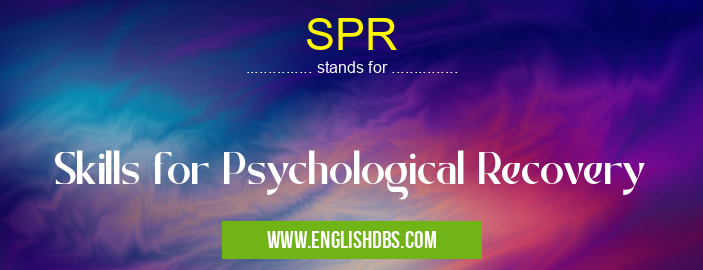What does SPR mean in PSYCHOLOGY
Skills for Psychological Recovery (SPR) is an evidence-based psychological intervention that teaches practical strategies to help people who have experienced traumatic events, subtle and overt forms of abuse, and other significant life transitions. The framework focuses on identifying key protective factors like resilience, self-efficacy, and personal strengths. It then helps to integrate those factors into a comprehensive recovery plan. SPR has been shown to be effective in reducing symptoms related to PTSD, depression, anxiety, and general mental distress.

SPR meaning in Psychology in Academic & Science
SPR mostly used in an acronym Psychology in Category Academic & Science that means Skills for Psychological Recovery
Shorthand: SPR,
Full Form: Skills for Psychological Recovery
For more information of "Skills for Psychological Recovery", see the section below.
What does SPR mean?
The acronym SPR stands for Skills for Psychological Recovery. It’s a therapeutic approach that teaches patients how to identify their own core protective factors—like resiliency, self-efficacy, and personal strengths—and use them to create a comprehensive recovery plan. SPR utilizes cognitive-behavioral therapy (CBT) techniques such as guided imagery and mindfulness meditation to help individuals manage their physical and emotional reactions following a traumatic event or series of events. The intervention also helps participants recognize the signs of relapse and design steps they can take to prevent it from happening again in the future. This approach is often combined with group therapy in order to maximize its impact on clients’ overall well being.
How Does it Work?
SPR employs a range of techniques designed to help people recover from trauma by increasing their feelings of safety, security, control over their environment, confidence in themselves and their ability to meet challenges head on while at the same time decreasing feelings of helplessness and fear caused by the trauma or stressful event(s). The program begins with an assessment phase where the therapist works with the client or patient to identify key protective factors like resilience, self-efficacy, support networks etc. Then during the active intervention phase these identified protective factors are integrated into comprehensive recovery plan utilizing a range of cognitive behavioral techniques such as guided imagery and mindfulness meditation; relaxation techniques; exposure therapies; exploring negative beliefs; creating alternative positive beliefs; problem solving skills; communication skills; conflict resolution skills; learning ways of dealing with anger or frustration; focusing on developing meaningful relationships etc..
Final Words:
In conclusion, Skills for Psychological Recovery is a highly effective psychological intervention that has helped many individuals struggling with mental health issues stemming from traumatic events or life transitions find stability and peace within themselves. It centers around assisting clients in becoming aware of their inner resources so they can implement healthy coping strategies throughout any trying situation that may arise in the future – thus promoting long-term psychological wellness.
SPR also stands for: |
|
| All stands for SPR |
